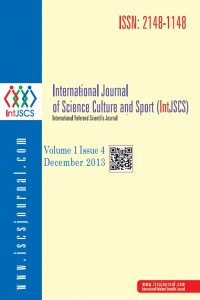Öz
Kaynakça
- Alderson JC (1984). Reading in a Foreign Language: a Reading Problem or a language problem? .Reading in a Foreign Language. 7: 465-503.
- Alptekin C (1993). Target Language Culture in EFL Material. ELT Journal, 47, 2, 136-142.
- Anderson RC and Pearson D (1984). A Schema-Theoretic view Reading Research. New York: Longman.
- Ausubel D (1963). The Psychology of Meaningful Verbal Learning. New York: Grune. Badrawi N (1994). Culture, Reading and Foreign Language Learner: The Effect of Culture on
- Reading Comprehension. CDELT. Ain Shams University. Barlett FC (1932). Remembering: A study in Experimental and Social Psychology.
- Cambridge: Cambridge University Press. Carrell P and Floyed P (1987). Effects on ESL Reading of Teaching Cultural Content
- Schemata. Language Learning, 37. 1, 89-106. Dwaik R (1997). The Role of Syntactic Knowledge in English as a Foreign Language
- Reading Comprehension. The Ohio State University. Faraj S (1998). Perceived Causes for the Weakness of Ninth Grade Students in English
- Listening Skill at West Bank UNRWA Schools. M.A. Thesis, Al-Quds University, Jerusalem. Mecartty F (1994). Lexical and Grammatical knowledge in second language reading and listening comprehension, UM Dissertation Services.
- Razi S (2003) The Effect of Cultural Schema and Reading Activities on Reading
- Comprehension. M.A. Thesis. Canakkale Onsekiz Mart University. Turkey.
Öz
This study aims to investigate the effect of cultural background knowledge on learning English Language. It also aims to investigate if there are significant differences between subjects' performance in reading comprehension according to sex and general ability in English (GAE). The study aims at answering the following questions: 1- To what extent is the effect of cultural background knowledge on subjects' performance in reading comprehension? 2- What is the difference in performance in reading comprehension between male and female subjects who have cultural background knowledge and those who do not have any knowledge? 3-What is the difference between subjects' performance in reading comprehension texts which are loaded with American culture and their general ability in English. ? The population of this study consisted of all first -year students majoring in English at Hebron University in the first semester of the academic year 2011/2012. They were 600. The sample of the study consisted of 60 subjects, males and females divided into four groups, two experimental and two controlled. The researcher followed the experimental method. Means, standard deviations and Pearson Product Moment Correlation were calculated by using SPSS program. The study revealed the following results: 1. There are statistically significant differences in performance in reading comprehension between subjects who have cultural background knowledge and those who do not have any knowledge. 2- There are no statistically significant differences in performance in reading comprehension between male and female subjects who have cultural background knowledge and those who do not have any knowledge. 3. Subjects' GAE revealed that there are significant differences in performance in reading comprehension between subjects who have cultural background knowledge and those who do not have any knowledge. In the light of the results of the study, the researcher recommends the following: 1- Teachers should activate two types of prior knowledge when introducing new information: subject knowledge and cultural knowledge.
Anahtar Kelimeler
Kaynakça
- Alderson JC (1984). Reading in a Foreign Language: a Reading Problem or a language problem? .Reading in a Foreign Language. 7: 465-503.
- Alptekin C (1993). Target Language Culture in EFL Material. ELT Journal, 47, 2, 136-142.
- Anderson RC and Pearson D (1984). A Schema-Theoretic view Reading Research. New York: Longman.
- Ausubel D (1963). The Psychology of Meaningful Verbal Learning. New York: Grune. Badrawi N (1994). Culture, Reading and Foreign Language Learner: The Effect of Culture on
- Reading Comprehension. CDELT. Ain Shams University. Barlett FC (1932). Remembering: A study in Experimental and Social Psychology.
- Cambridge: Cambridge University Press. Carrell P and Floyed P (1987). Effects on ESL Reading of Teaching Cultural Content
- Schemata. Language Learning, 37. 1, 89-106. Dwaik R (1997). The Role of Syntactic Knowledge in English as a Foreign Language
- Reading Comprehension. The Ohio State University. Faraj S (1998). Perceived Causes for the Weakness of Ninth Grade Students in English
- Listening Skill at West Bank UNRWA Schools. M.A. Thesis, Al-Quds University, Jerusalem. Mecartty F (1994). Lexical and Grammatical knowledge in second language reading and listening comprehension, UM Dissertation Services.
- Razi S (2003) The Effect of Cultural Schema and Reading Activities on Reading
- Comprehension. M.A. Thesis. Canakkale Onsekiz Mart University. Turkey.
Ayrıntılar
| Birincil Dil | İngilizce |
|---|---|
| Konular | Spor Hekimliği |
| Bölüm | Makaleler |
| Yazarlar | |
| Yayımlanma Tarihi | 12 Aralık 2013 |
| Yayımlandığı Sayı | Yıl 2013 Cilt 1 - Sayı 4 |

